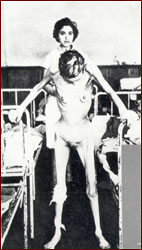
|

|
Among the small minority of those experimented upon who survived to bring shocking details of the atrocities to the outside world are a vocal group who would consign the data to oblivion. Many make the same arguments that modern doctors and scientists opposed to the data's use make, namely, that using the information would legitimize the Nazi experimenters and their damnable undertakings, make us moral accomplices, further demean the victims, etc. Responses from survivors asked whether the data should be used ranged from the calm and reasoned to the incredulous: "No! No! No! I (we) suffered, and it is no 'medical data' or 'information' whatsoever!!!" [21] "As much as I am for scientific research for the betterment of humanity, I do feel that the scientific data collected from experiments done on inmates of Nazi concentration camps should not be used. If I would agree, I feel I [would] give a stamp of approval to the ways and means [these] experiments have been conducted and quasi-legalize [them]."—Anonymous survivor of Dr. Josef Mengele's twins experiments at Auschwitz [22] 
References 21. Segal, Nancy L. "Twin Research at Auschwitz-Birkenau: Implications for the Use of Nazi Data Today." In Caplan, p. 292. 22. Ibid., pp. 292-3. 23. Vigorito, Sara Seiler. "A Profile of Nazi Medicine: The Nazi Doctor—His Methods and Goals." In Caplan, p. 13. 24. Kor, Eva Mozes. "Nazi Experiments as Viewed by a Survivor of Mengele's Experiments." In Caplan, p. 7. 25. Konopka, Gisela. "The Meaning of the Holocaust for Bioethics." In Caplan, p. 17. Photo: Courtesy of the U.S. Government Printing Office The Director's Story | Timeline of Nazi Abuses Results of Death-Camp Experiments: Should They Be Used? Exposing Flawed Science | Resources Transcript | Site Map | Holocaust on Trial Home Editor's Picks | Previous Sites | Join Us/E-mail | TV/Web Schedule About NOVA | Teachers | Site Map | Shop | Jobs | Search | To print PBS Online | NOVA Online | WGBH © | Updated October 2000 |
